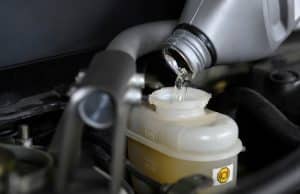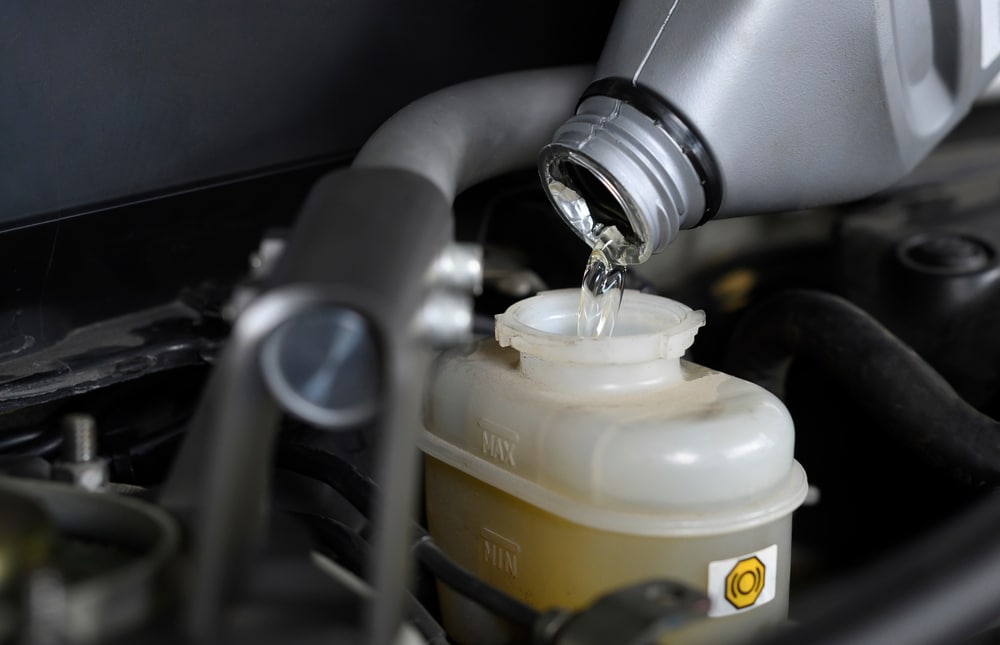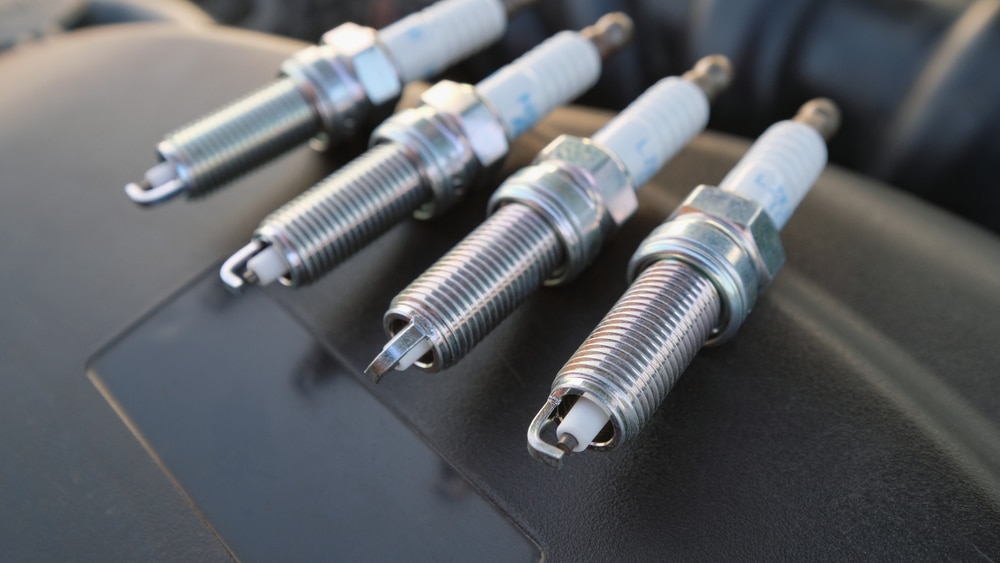Brake Fluid
Many drivers rarely think about their brake fluid, yet it is vital for ensuring your vehicle can stop safely when it matters most. Over time, brake fluid gradually deteriorates as it absorbs moisture, which weakens its performance and increases your stopping distance during emergencies.
This is why routine brake fluid inspections and timely changes are more than just routine maintenance. They are a key safety requirement.
At Standish Service Station, we carry out brake fluid checks and complete fluid changes in line with your manufacturer’s guidelines, delivering main dealer standards at better value. Call us on 01257 422899 to arrange your brake fluid check or replacement. We proudly serve drivers across Wigan, Bolton, and nearby areas, with expert advice on ABS systems and overall brake safety.

What Exactly Is Brake Fluid?
Brake fluid is at the heart of every braking system, ensuring that every press of the brake pedal translates into precise, reliable stopping power. It not only delivers a firm pedal response but also shields critical parts from damage, keeping the system smooth and dependable.
This specialised hydraulic fluid is designed to transfer the pressure from your foot on the brake pedal to the wheels. Because brake fluid is incompressible, the force you apply is instantly relayed through the system. When you brake, the fluid pushes pressure through lines and into components such as callipers and wheel cylinders, which then press the brake pads or shoes onto the brake disc or drum to slow the vehicle.
However, its job goes beyond pressure transfer. Brake fluid also helps protect internal parts from rust and corrosion while maintaining the lubrication of key seals and components. It is built to withstand extreme pressure and heat without breaking down, but only if it remains in good condition.
This is why having the correct type of brake fluid, kept in good condition, is essential. In a system where every fraction of a second matters, brake fluid is a small but crucial link in keeping you safe on the road.
How Brake Fluid Powers Your Brakes
To understand why brake fluid is so important, it helps to look at how it actually functions.
Pressing the brake pedal doesn’t mean you are directly forcing parts onto the wheels. Instead, your foot applies pressure to a master cylinder, which compresses the brake fluid inside. This pressurised fluid then moves through a network of brake lines, delivering force to callipers or wheel cylinders, depending on your car’s design.
That hydraulic pressure pushes the brake pads or shoes against the brake discs or drums, creating friction that slows the vehicle down. When the fluid is in good condition, it stays incompressible, transferring force quickly and evenly so your brakes respond exactly when you need them.
Brake fluid also has to maintain this reliability when temperatures rise and under the high stress of modern braking systems. Advanced features such as ABS and traction control depend on the fluid’s precise performance to function properly.
Though it may look like a minor component, brake fluid is the unseen force making every safe stop possible.
Locating Your Brake Fluid Reservoir
If you open the bonnet and see a small, semi-transparent container positioned towards the rear of the engine bay on the driver’s side, you are most likely looking at the brake fluid reservoir.
This reservoir includes a rubber diaphragm or sealing cap designed to prevent air and moisture from entering, as brake fluid naturally draws in water over time. Allowing moisture to accumulate can seriously affect braking performance. The container is typically translucent, so fluid levels can be checked visually, without removing the cap. However, to properly assess the fluid’s colour and condition, the cap needs to be removed.
The brake fluid reservoir acts as a quick indicator of your braking system’s health. Any sudden drop in fluid level or a change in its appearance should be examined by trained professionals without delay.
What Are The Various Types of Brake Fluid?
There are many different brake fluids, and using the correct one is crucial to how well your braking system performs. Choosing the wrong type can damage components or reduce braking effectiveness.
Here’s a simple overview of the main types you’ll come across:
- DOT 3 Brake Fluid – A glycol-based option with a relatively low boiling point, often used in older vehicles without modern braking systems. It is hygroscopic, meaning it naturally absorbs moisture over time.
- DOT 4 Brake Fluid – The standard for most modern cars. It offers a higher boiling point than DOT 3, making it better suited for advanced systems, particularly those with ABS or traction control. Like DOT 3, it absorbs water and requires regular replacement.
- DOT 5 Brake Fluid – A silicone-based fluid that doesn’t absorb water. It is typically reserved for classic or specialist vehicles and is not compatible with DOT 3 or DOT 4 systems. Mixing them can cause severe damage to seals and lead to brake failure.
- DOT 5.1 Brake Fluid – Delivers performance similar to DOT 5 but is glycol-based like DOT 3 and DOT 4. It’s designed for vehicles needing superior thermal performance.
Because every vehicle has specific requirements, selecting the right brake fluid is vital. At Standish Service Station in Standish, we ensure the correct fluid is used to keep your braking system operating at its best.
What Factors Can Impact Brake Fluid Performance?
Brake fluid isn’t immune to wear. Over time, it faces heat, moisture, and debris that steadily reduce its effectiveness, putting the entire braking system at risk if not replaced as recommended.
Here’s what can compromise your brake fluid:
Moisture Absorption – Being hygroscopic, brake fluid naturally draws in water from the air, even through tiny gaps in hoses or seals. As moisture levels rise, the boiling point drops, making vapour lock more likely under heavy braking. Vapour lock creates air bubbles that severely weaken braking pressure.
Extreme Heat and Pressure – Every time you brake, the system generates high temperatures. Prolonged exposure to these extremes can cause the fluid to chemically degrade, making it less stable and prone to failure under load.
Additive Breakdown – Quality fluids include protective additives to prevent corrosion and maintain seal integrity. As these additives deplete, metal components and rubber seals become more vulnerable.
Contamination – Rubber fragments, rust, or even mixing the wrong type of fluid can pollute the system. These contaminants can damage seals and reduce braking response.
Old or Incorrect Fluid – Out-of-date fluid or using the wrong grade can impact ABS, traction control, and brake pressure regulation. While day-to-day driving might feel normal, emergency stops can become dangerously inconsistent.
Brake fluid has a limited lifespan, and leaving it too long can lead to weak braking or, in severe cases, total brake failure. At Standish Service Station, we test your brake fluid during servicing and advise when a change is essential to keep you safe.
How to Tell When Your Brake Fluid Needs Replacing
Your dashboard won’t display a dedicated warning light for brake fluid condition, which is why proactive checks are essential. Regular servicing at Standish Service Station in Standish ensures your brake fluid remains in peak condition, preventing hidden faults from affecting your safety.
Watch for these common indicators that it might be time for a professional inspection:
- Soft or Spongy Pedal Feel – If the pedal feels less firm or requires extra pressure, moisture or air could be interfering with the fluid’s ability to maintain hydraulic force.
- Warning Lights – Some vehicles illuminate ABS or brake system warning lights when fluid levels are low or when pressure variations are detected. This should always be inspected by a trained technician.
- Burning or Harsh Smell – A scorched or chemical-like smell from the fluid, noticeable when the reservoir cap is removed, may indicate the fluid has broken down and needs replacing.
- Dirty or Discoloured Fluid – Fresh brake fluid is clear or light in colour. A dark, cloudy, or murky appearance often points to contamination from rust, moisture, or debris.
If any of these warning signs appear, book a brake fluid assessment with us. Our expert team at Standish Service Station will ensure your braking system remains responsive and dependable.
The Risks of Overlooking Brake Fluid Problems
Brake fluid issues rarely make themselves obvious, which is exactly what makes them dangerous.
Early signs may seem minor, but as the fluid absorbs moisture or deteriorates under intense heat, the entire braking system can gradually lose its sharpness — often without you realising it.
Ignoring these changes can result in reduced stopping power, internal damage to seals and components, or in extreme cases, total brake failure. The safest approach is to have your brake fluid checked and replaced at the recommended intervals, like during your annual service.
If you are unsure about the condition of your brake fluid, contact Standish Service Station in Standish. Our specialists will inspect the system and replace the fluid in line with the manufacturer’s specifications, ensuring your car remains safe and reliable on the road.
Book Your Brake Fluid Service with Standish Service Station
Brake fluid isn’t designed to last forever. Over time, it absorbs moisture, loses its ability to hold pressure effectively, and can even lead to brake failure if left unchanged. Because this wear happens gradually, many drivers don’t notice a problem until it becomes a real safety risk. That’s why routine brake fluid changes are essential to keep your braking system operating at its best.
At Standish Service Station in Standish, we provide a full brake fluid change as part of your scheduled service. We use the exact fluid grade recommended by your vehicle’s manufacturer — the same standard you’d expect from a dealership, but at far better value. It’s also during these services that we carry out a visual check of your braking components for early signs of wear.
Why book with us?
✔ We follow your vehicle manufacturer’s specifications
✔ Our technicians are fully trained and experienced
✔ Brake fluid is tested during routine servicing
✔ All work includes a 12-month parts and labour guarantee
If it’s been a while since your last brake fluid change or you’ve noticed changes in braking response, call us today on 01257 422899 to book your appointment. We’ll keep you safer for longer and prevent minor issues from becoming costly hazards.



